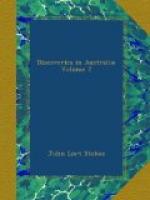DEATH OF MR. FREDERIC SMITH.
One of their party, Mr. Frederick Smith, had been left behind; and so bewildered were they in their despair, that they could give no definite account of what had become of him. Mr. Roe immediately went in search, and not many miles in the rear, found the poor fellow quite dead in a bush, with his blanket half rolled round him. It appeared that he had tried to scramble up a sandhill and had fallen back into the bush and died—a sad and melancholy fate for one so young. He had laboured under great disadvantages in walking, having cut his feet in very gallantly swimming out to save one of the boats during a hurricane in Sharks Bay. He was reduced to a perfect skeleton; having, in fact, been starved to death. The sight drew forth a tributary tear of affection even from the native who accompanied the party. Mr. Roe consigned poor young Smith’s remains to the earth, and setting up a piece of board to mark the spot, smoothed down his lonely pillow, and moved with his companions in mournful silence towards the south.
It must have been an impressive scene; the sun, as if conscious that he was shining for the last time on the remains of the ill-fated young explorer, seemed to linger as if unwilling to descend into the western horizon; and his full red orb painted a number of light airy clouds that floated through the sky in the most brilliant colours, and shed a stream of fire over the water as it rolled with a mournful dirge-like sound on the strand close by. The howl of a wild dog now and then fell on their ears as they performed their melancholy task, and alone broke the stillness that reigned around, as they retreated slowly along the beach.
Whilst on this humane excursion, Mr. Roe witnessed a wondrous gift possessed by the natives. The one that accompanied him, perceiving footmarks on the sand, where some of his countrymen had been, was enabled by them to tell Mr. Roe, not only in what number they were, but THE NAME OF EACH. This account was verified on their return to Perth, from whence the natives had been sent during Mr. Roe’s absence on the same errand.
HURRICANE IN SHARKS’ BAY.
The hurricane I have mentioned, as encountered by Captain Grey in Sharks Bay, latitude 26 degrees South, occurred on February 28th, which, corresponding with the hurricane season of the Mauritius, leaves little doubt that at the same time the shores of New Holland are occasionally visited by more easterly ones, moving in nearly the same direction. The other two instances of hurricanes occurring in the neighbourhood are those of the Ceres, in 1839, in latitude 21 degrees South, above 300 miles North-North-West from Sharks Bay, and of the Maguashas towards the end of February,* 1843, in latitude 18 degrees South, about 400 miles north of the same place. Ships, therefore, passing along the North-west coast of New Holland at the season we have mentioned, should be prepared for bad weather. The hurricane experienced by Captain Grey began at South-east and ended at North-west. The lull in the centre of it showed that the focus of the storm must have passed over that locality. Captain Grey does not enter sufficiently into detail to enable us to trace the veering of the wind.




